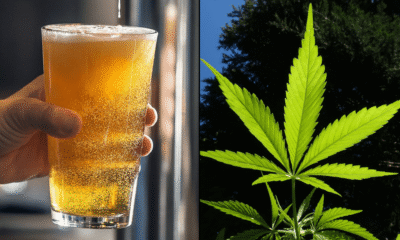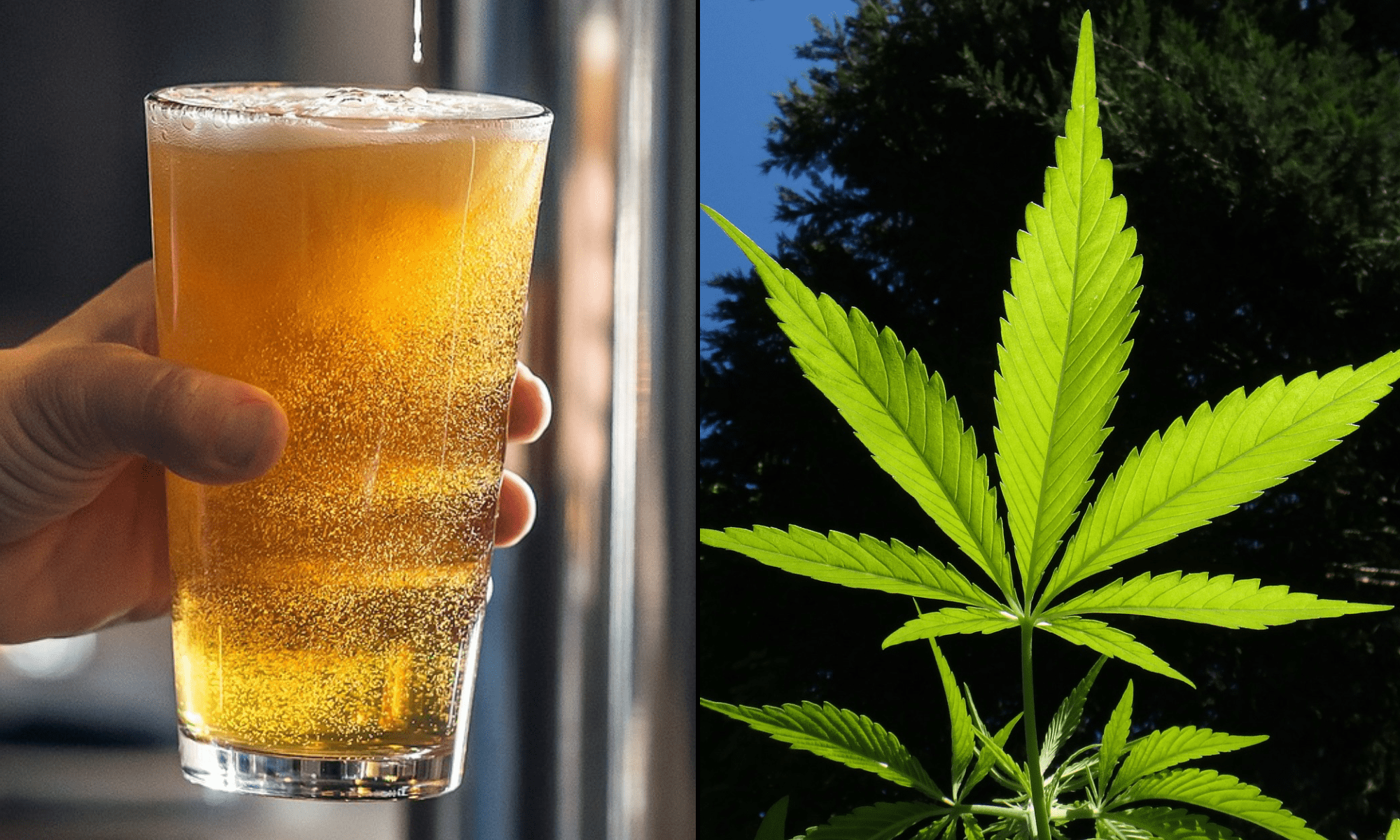featured
Kentucky’s First Medical Marijuana Dispensary Has Been Approved For Operations, Governor Announces
Published
2 weeks agoon

The governor of Kentucky has announced that the state’s first medical cannabis dispensary has officially been approved for operations.
“Great news, Kentucky—today, we approved the state’s first medical cannabis dispensary for operations in Beaver Dam,” Gov. Andy Beshear (D) said in a social media post on Thursday. “The Post Dispensary is expected to open its doors this fall.”
“This is another step forward as we work to ensure Kentuckians with serious medical conditions have access to the medicine they need and deserve,” the governor said.
The announcement comes about two weeks after Beshear touted an earlier “milestone” in the state’s forthcoming medical marijuana program, with a licensed cultivator producing “the first medical cannabis inventory in Kentucky history.”
The governor previewed that development late last month, stating that he expected to see medical marijuana growers “putting seed in the ground really soon,” while projecting that patients will have access to cannabis before the year’s end.
Beshear’s office has said that other cannabis licensees, including processors and testing labs, are expected to become operational within the coming weeks.
Last week, Beshear sent a letter to President Donald Trump, urging him to reject congressional spending bill provisions that would prevent the Justice Department from rescheduling marijuana.
In the letter to the president, he emphasized that a pending proposal to move cannabis from Schedule I to Schedule III under the Controlled Substances Act (CSA) is something “you supported in your presidential campaign.”
“That process should be allowed to play out. Americans deserve leadership that won’t move the goalposts on them in the middle of the game,” Beshear said, noting that he was among the tens of thousands who submitted public comments in favor of the reform after it was initiated under the Biden administration, “demonstrating broad public interest in rescheduling.”
“I joined that effort because this is about helping people. Rescheduling would provide suffering patients the relief they need,” the governor said. “It would ensure communities are safer—because legal medical products reduce the illicit market. It would provide new, meaningful research on health benefits.”
Beshear also mentioned a letter to DEA he signed onto last year urging rescheduling, “because the jury is no longer out on marijuana. It has medical benefits.”
Back on the state level, the governor recently said he acknowledges that “it’s taken longer than we would have liked” to stand up the industry since he signed medical marijuana legalization into law in 2023.
In recognition of that delayed implementation, he recently signed an executive order to waive renewal fees for patients who get their cards this year so that they don’t get charged again before retailers open. And another order he signed providing protections for qualified patients who obtain medical marijuana outside of Kentucky “will stay in place.”
Beshear separately announced in May that the state has launched a new online directory that lets people see where medical cannabis dispensaries will be opening near them.
He emphasized that the state has been working to deliver access to patients “at the earliest possible date,” and that involved expediting the licensing process. The governor in January also ceremonially awarded the commonwealth’s first medical marijuana cards.
—
Marijuana Moment is tracking hundreds of cannabis, psychedelics and drug policy bills in state legislatures and Congress this year. Patreon supporters pledging at least $25/month get access to our interactive maps, charts and hearing calendar so they don’t miss any developments.![]()
Learn more about our marijuana bill tracker and become a supporter on Patreon to get access.
—
Meanwhile, the governor sent a letter to Kentucky’s congressional delegation in January, “urging them to take decisive action to protect the constitutional rights of our law abiding medical cannabis patients” by repealing the federal ban on gun possession by people who use marijuana.
That came after bipartisan Kentucky senators filed legislation that similarly called on the state’s federal representatives to take corrective action, which Beshear said he supports but would like to see even more sweeping change on the federal level.
The federal Bureau of Alcohol, Tobacco, Firearms and Explosives (ATF) warned Kentucky residents late last year that, if they choose to participate in the state’s medical marijuana program, they will be prohibited from buying or possessing firearms under federal law.
As far as the implementation of the state’s medical cannabis law goes, Beshear said in his State of the Commonwealth address in January that patients will have access to cannabis sometime “this year.” He also later shared tips for patients to find a doctor and get registered to participate in the cannabis program.
Health practitioners have been able to start assessing patients for recommendations since the beginning of December.
While there currently aren’t any up-and-running dispensaries available to patients, Beshear has further affirmed that an executive order he signed in 2023 will stay in effect in the interim, protecting patients who possess medical cannabis purchased at out-of-state licensed retailers.
During last year’s November election, Kentucky also saw more than 100 cities and counties approve local ordinances to allow medical cannabis businesses in their jurisdictions. The governor said the election results demonstrate that “the jury is no longer out” on the issue that is clearly supported by voters across partisan and geographical lines.

Author: mscannabiz.com
MScannaBIZ for all you Mississippi Cannabis News and Information.
You may like
-


The Cannabist Co. Divests Dispensary Footprint in Pennsylvania
-


A Fresh Start: Vicksburg Nutrition brings health, flavor, and heart to the community
-


New York State Faces Lawsuit After Cannabis Regulators Admit Measuring Mistake
-


New Mississippi vape law takes effect in October, only FDA-authorized products allowed
-


More Young Adults Are Opting For Cannabis Drinks Over Alcohol At After-Work Happy Hours, Poll Shows
-


How AI Is Changing The Cannabis Industry
featured
The Cannabist Co. Divests Dispensary Footprint in Pennsylvania
Published
37 minutes agoon
August 18, 2025
[PRESS RELEASE] – NEW YORK, Aug. 18, 2025 – The Cannabist Co. Holdings Inc., one of the most experienced cultivators, manufacturers and retailers of cannabis products in the U.S., announced the successful closing of the sale of its Pennsylvania affiliate that owns the medical dispensaries to VP Investment Holdings LLC. VP Holdings is comprised of principals from a leading privately held dispensary operator in Pennsylvania, Restore Integrative Wellness Center LLC.
The sale will include a concurrent supply agreement with VP Holdings for products produced by Cannabist’s grow/processing affiliate, Green Leaf Medicals LLC (gLeaf). This strategic Pennsylvania transaction accelerates The Cannabist Co.’s wholesale cultivation presence by enhancing the commercialization of its state-of-the-art grow-processor facility located in Saxton, Pa., while continuing to serve the broader medical market through high-quality medical marijuana.
Pennsylvania Transaction Highlights
- VP Holdings acquired Columbia Care Pennsylvania LLC from Columbia Care LLC via an equity purchase agreement for approximately $10 million in cash paid at closing.
- Columbia Care Pennsylvania’s three operational medical dispensaries are located in Scranton, Allentown and Wilkes-Barre, Pa. VP Holdings expects to rebrand all three locations to the Restore brand immediately.
- As additional consideration, VP Holdings and Restore have entered into a supply agreement with The Cannabist Co. (through gLeaf), thereby expanding The Cannabist Co.’s wholesale distribution footprint in Pennsylvania.
- The Cannabist Co. will continue to enhance and expand its wholesale presence in-state by driving the performance of its Saxton grow-processor facility.
The Cannabist Co. Management Commentary
“This Pennsylvania transaction is a clear example of executing on our strategic plan to simplify our business and optimize existing assets, while delivering immediate financial benefits,” CEO David Hart said. “We’ve taken a proactive and thoughtful step that strengthens our balance sheet, bolsters liquidity and enhances our operational focus. By divesting our retail footprint in Pennsylvania for all cash and entering into a meaningful wholesale agreement, we are now better positioned to optimize our best-in-class Saxton cultivation facility and expand distribution of our high-quality products to patients across the state. This transaction positions us to better capitalize on the current medical landscape and future opportunities in a potential adult-use market.”
CLD Advisory served as exclusive financial adviser, and Foley Hoag LLP served as legal adviser, while Cannabis Law Solutions served as Pennsylvania regulatory counsel to The Cannabist Co. Ballard Spahr LLP acted as legal adviser to Restore.

Author: mscannabiz.com
MScannaBIZ for all you Mississippi Cannabis News and Information.
featured
New York State Faces Lawsuit After Cannabis Regulators Admit Measuring Mistake
Published
2 hours agoon
August 18, 2025
A group of licensed cannabis dispensaries in New York is suing state regulators over a rule change that threatens to shutter or relocate dozens of businesses.
The lawsuit, filed Aug. 15 in State Supreme Court in Albany, argues that the state’s Office of Cannabis Management (OCM) abruptly reinterpreted a law requiring cannabis shops to be at least 500 feet from schools. Since 2022, regulators measured that distance from one entrance to another. In July 2025, officials said the law should have been measured from a school’s property line, a correction that rendered at least 152 dispensaries noncompliant according to the New York Times and the Associated Press.
Who Is Suing
The twelve petitioners include seven licensed businesses that are open or fully approved (ConBud, The Cannabis Place, Summit Canna, Hush, High Fade, Housing Works Cannabis Co., and Common Courtesy Dispensary) and five provisionally licensed applicants, Rezidue, Elise Pelka, Toastree, Monarch NYC, and Luxe Leaf Boutique. The businesses span Manhattan, Queens, and the Bronx, as reported by Cannabis Business Times.
The Lawsuit’s Arguments
The complaint states that regulators “poured their life savings into launching their businesses” after approvals from the state, only to be told their locations are now in violation. Petitioners say OCM changed its interpretation of the law without a formal rulemaking process, violating the State Administrative Procedure Act. They also argue that the change strips them of due process and equal protection.
“Relying on those approvals, petitioners poured their life savings into launching their businesses,” the complaint says. “They signed leases, completed build-outs, hired employees and opened their doors to the public under the state’s very detailed framework. But now, in a complete about-face, OCM incredulously claims it got the law wrong all along.”
Attorney Jorge Luis Vasquez Jr., who represents the plaintiffs, said the harm goes far beyond money. “This is way more than just financial harm to small businesses,” Vasquez told Gothamist. “This goes beyond money. This is time. This is resources. This is energy. This is building relationships with communities.”
The Stakes
State officials acknowledged the mistake affects 108 licensees and 44 provisional applicants. The OCM has told licensed businesses they can stay open for now, but cannot renew licenses until lawmakers act. Provisional applicants will need to relocate, with access to a $15 million fund that offers up to $250,000 each, according to Gothamist and the AP.
For many dispensary owners, that relief falls far short. The lawsuit cites buildout costs between $500,000 and $1 million per business, plus millions more in operational expenses. Several plaintiffs signed personal guarantees on leases, creating a risk of bankruptcy if they are forced to move, Cannabis Business Times reported.
Equity Concerns
Eleven of the twelve plaintiffs hold conditional adult-use retail dispensary (CAURD) licenses, reserved for justice-involved New Yorkers, and one holds a social and economic equity license. Plaintiffs argue the rule change undermines the state’s promise to prioritize those harmed by prohibition.
“OCM’s reinterpreted rule disproportionately harms these stakeholders and licensees and undermines the very purpose of this law,” the complaint states.
In a joint statement sent to High Times, the coalition Save New York Legal Cannabis for All said that licensed cannabis operators “have worked in good faith, invested their life savings, and followed the rules set forth by the State.” The group, which includes ConBud, The Cannabis Place, Rezidue, Summit Canna, Hush, High Fade, Elise Pelka, Housing Works Cannabis Co., Common Courtesy Dispensary, Toastree, and Monarch NYC, warned that OCM’s announcement threatens the small business owners and equity licensees who form “the backbone of this industry.”
“OCM was supposed to follow a multistep process laid out by law before making such an earth-shattering determination, yet it completely failed to do so,” the statement reads. “Worse, OCM’s proposed ‘solution’ to the damage caused by its carelessness will not actually help us. This so-called solution… still leaves licensees out of compliance, and when a cannabis business is out of compliance, it cannot access banking, real estate, or investment—no matter what the state says.”
The coalition said the lawsuit was filed “to ensure every licensed operator is protected and given a fair path to compliance and success,” and called on lawmakers to adopt a “functional solution that includes all operators, safeguards investments, and fulfills the promise of a truly equitable cannabis program that benefits all New Yorkers.”
State Response
OCM Acting Executive Director Felicia Reid apologized to affected businesses and said legislative intervention is needed to allow them to remain in place, according to the New York Times. Gov. Kathy Hochul called the error “a major screw-up” and promised to work with lawmakers to keep dispensaries open. A spokesperson for Hochul told Gothamist the governor “has been clear that she will work with the Legislature to ensure these hardworking businesses are able to continue to operate without interruption.”
Despite the turmoil, New York’s regulated cannabis market is expected to reach $1 billion in sales this year. But with hundreds of equity-focused businesses now facing relocation or closure, industry leaders warn that the proximity dispute could further destabilize an already rocky rollout.
Photo by Luca Bravo on Unsplash

Author: mscannabiz.com
MScannaBIZ for all you Mississippi Cannabis News and Information.
featured
More Young Adults Are Opting For Cannabis Drinks Over Alcohol At After-Work Happy Hours, Poll Shows
Published
3 hours agoon
August 18, 2025
Younger Americans are increasingly using cannabis-infused beverages as a substitute for alcohol—with one in three millennials and Gen Z workers choosing THC drinks over booze for after-work activities like happy hours, according to a new poll.
The survey from Drug Rehab USA assessed the recreational preferences of 1,000 employed adults, finding more evidence that as the marijuana legalization movement achieves greater success and as awareness of alcohol-related harms has spread, a significant portion of those generations are opting for cannabis over booze.
All told, 66 percent of American adults say they’ve tried alcohol alternatives over the past six months. And 24 percent of respondents said they’ve “at least partially” replaced alcohol with non-alcohol or cannabis-based drinks.
That trend is being led by millennials and Gen Z, one of three of whom said they used THC beverages instead of alcohol drinks.
“To unwind after work, 45 percent drink alcohol, while 24 percent use nicotine, 20 percent turn to cannabis, and 16 percent choose alcohol alternatives like mocktails, non-alcoholic beer, or CBD,” the survey found.
“When it comes to winding down after a long day, Americans are reaching for a mix of familiar comforts and emerging alternatives,” Drug Rehab USA said. “While alcohol still dominates, the competition between nicotine and cannabis shows how habits are evolving across generations.”
“After-work rituals are no longer limited to a nightly drink—or even to alcohol at all. From THC-infused beverages to nicotine pouches and non-alcoholic alternatives, today’s habits reflect a broader redefinition of what it means to unwind. While motivations vary—stress, routine, social connection—the through-line is clear: Americans are turning to consumable rituals to draw a line between work and rest. For many, those rituals begin within the hour and recur multiple times a week.”
The survey findings largely track with other research assessing emerging trends in cannabis and alcohol use.
For example, a recent rodent study determined that the cannabinoid CBD reduces rates of binge drinking and alcohol blood concentrations.
Results of a separate study published in the journal Molecular Psychiatry also indicated that a single, 800-milligram dose of CBD can help manage certain alcohol cravings among people with alcohol use disorder (AUD), supporting the use of the marijuana component as a potential treatment option for problem drinkers.
Federally funded research into the effects of cannabis on alcohol use that was published in May also found that people who used marijuana immediately before drinking subsequently consumed fewer alcoholic beverages and reported lower cravings for alcohol.
The study follows a separate survey analysis published in March that found that three in four young adults reported substituting cannabis for alcohol at least once per week—a “fast-emerging” trend that reflects the “rapid expansion” of the hemp product marketplace.
The report from Bloomberg Intelligence (BI) found that, across various demographics, cannabis is increasingly being used as an alternative to alcohol and even non-alcoholic beverages as more companies—including major multi-state marijuana operators (MSOs)—expand their offerings.
The findings were largely consist with a growing body of studies indicating that cannabis—whether federally legal hemp or still-prohibited marijuana—is being utilized as a substitute for many Americans amid the reform movement.
An earlier survey from YouGov, for example, found that a majority of Americans believe regular alcohol consumption is more harmful than regular marijuana use. Even so, more adults said they personally prefer drinking alcohol to consuming cannabis despite the health risks.
A separate poll released in January determined that more than half of marijuana consumers say they drink less alcohol, or none at all, after using cannabis.
Yet another survey—which was supported by the National Institute on Drug Abuse (NIDA) and released in December—found that young adults are nearly three times more likely to use marijuana than alcohol on a daily or near-daily basis.
That poll provided more granular, age-specific findings than a similar report published last year, finding that more Americans overall smoke marijuana on a daily basis than drink alcohol every day—and that alcohol drinkers are more likely to say they would benefit from limiting their use than cannabis consumers are.
A separate study published in the journal Addiction last year similarly found that there are more U.S. adults who use marijuana daily than who drink alcohol every day.
In December, BI also published the results of a survey indicating that substitution of cannabis for alcohol is “soaring” as the state-level legalization movement expands and relative perceptions of harm shift. A significant portion of Americans also said in that poll that they substitute marijuana for cigarettes and painkillers.
Another BI analysis from last September projected that the expansion of the marijuana legalization movement will continue to post a “significant threat” to the alcohol industry, citing survey data that suggests more people are using cannabis as a substitute for alcoholic beverages such a beer and wine.
Yet another study on the impact of marijuana consumption on people’s use of other drugs that was released in December suggested that, for many, cannabis may act as a less-dangerous substitute, allowing people to reduce their intake of substances such as alcohol, methamphetamine and opioids like morphine.
A study out of Canada, where marijuana is federally legal, found that legalization was “associated with a decline in beer sales,” suggesting a substitution effect.
The analyses comport with other recent survey data that more broadly looked at American views on marijuana versus alcohol. For example, a Gallup survey found that respondents view cannabis as less harmful than alcohol, tobacco and nicotine vapes—and more adults now smoke cannabis than smoke cigarettes.
A separate survey released by the American Psychiatric Association (APA) and Morning Consult last June also found that Americans consider marijuana to be significantly less dangerous than cigarettes, alcohol and opioids—and they say cannabis is less addictive than each of those substances, as well as technology.
Meanwhile, a leading alcohol industry association is calling on Congress to dial back language in a House committee-approved spending bill that would ban most consumable hemp products, instead proposing to maintain the legalization of naturally derived cannabinoids from the crop and only prohibit synthetic items.

Author: mscannabiz.com
MScannaBIZ for all you Mississippi Cannabis News and Information.

The Cannabist Co. Divests Dispensary Footprint in Pennsylvania

A Fresh Start: Vicksburg Nutrition brings health, flavor, and heart to the community

New York State Faces Lawsuit After Cannabis Regulators Admit Measuring Mistake

New Mississippi vape law takes effect in October, only FDA-authorized products allowed

More Young Adults Are Opting For Cannabis Drinks Over Alcohol At After-Work Happy Hours, Poll Shows

How AI Is Changing The Cannabis Industry

12 New York Cannabis Businesses Sue State Over School Proximity Fiasco

Massachusetts Auditor Notes ‘Violations’ and ‘Mismanagement’ At Cannabis Control Commission

Supreme Court Gives Marijuana Companies More Time To File Petition In Case Challenging Federal Prohibition

Canopy USA Appoints New Executive Team to Accelerate Growth

Washington Adult-Use Cannabis Sales Decline for Fifth Straight Year

Delaware Governor Seeks Marijuana Regulation Advice From Colorado Counterpart As State’s Legal Market Launches

Major trucking group’s cannabis rescheduling concerns (Newsletter: August 18, 2025)

From The Vault: The HIGH TIMES interview Allen Ginsberg (1992)

Court throws out part of New York’s marijuana licensing rules

Watch Immigration Enforcement Rattles the Cannabis Industry | SoCal Matters Season 2025

Two arrested as police close four unlicensed cannabis shops in Seneca Falls

High-potency cannabis use linked to psychosis | Watch News Videos Online

High Times Strains Of The Month: August 2025

Texas Crime Labs Say They Don’t Have Enough Resources To Test Hemp Products For THC As Lawmakers Consider Ban

Trump on changes to marijuana policy: 'We're looking at it'

Realtors’ Stolen Credit Cards Are Used to Build an Illegal Marijuana Farm

Grady County Sheriff's Office makes arrests in illegal marijuana bust

High Times Was The Most Influential Publication Of My Life

Alert: Department of Cannabis Control updates data dashboards with full data for 2023

Connecticut Appoints The US’s First Cannabis Ombudsperson – Yes there is a pun in there and I’m Sure Erin Kirk Is Going To Hear It More Than Once!

5 best CBD creams of 2024 by Leafly

EU initiative begins bid to open access to psychedelic therapies
New Study Analyzes the Effects of THCV, CBD on Weight Loss

Free delta-9 gummies from Bay Smokes

5 best autoflower seed banks of 2024 by Leafly

Discover New York’s dankest cannabis brands [September 2024]

Curaleaf Start Process Of Getting Their Claws Into The UK’s National Health System – With Former MP (Resigned Today 30/5/24) As The Front Man

May 2024 Leafly HighLight: Pink Runtz strain

Mississippi city official pleads guilty to selling fake CBD products

Press Release: CANNRA Calls for Farm Bill to Clarify Existing State Authority to Regulate Hemp Products

Local medical cannabis dispensary reacts to MSDH pulling Rapid Analytics License – WLBT

Horn Lake denies cannabis dispensary request to allow sale of drug paraphernalia and Sunday sales | News

5 best THC drinks of 2024 by Leafly

Nevada CCB to Accept Applications for Cannabis Establishments in White Pine County – “Only one cultivation and one production license will be awarded in White Pine County”

6 best CBD gummies of 2024 by Leafly

The Daily Hit: October 2, 2024

5 best delta-9 THC gummies of 2024 by Leafly

Weekly Update: Monday, May 13, 2024 including, New Guide for Renewals & May Board meeting application deadline

PRESS RELEASE : Justice Department Submits Proposed Regulation to Reschedule Marijuana

People In This State Googled ‘Medical Marijuana’ The Most, Study Shows

Thailand: Pro-cannabis advocates rally ahead of the government’s plan to recriminalize the plant

5 best THCA flower of 2024 by Leafly
Trending
-

 California Cannabis Updates1 year ago
California Cannabis Updates1 year agoAlert: Department of Cannabis Control updates data dashboards with full data for 2023
-

 Breaking News1 year ago
Breaking News1 year agoConnecticut Appoints The US’s First Cannabis Ombudsperson – Yes there is a pun in there and I’m Sure Erin Kirk Is Going To Hear It More Than Once!
-

 best list1 year ago
best list1 year ago5 best CBD creams of 2024 by Leafly
-

 Business11 months ago
Business11 months agoEU initiative begins bid to open access to psychedelic therapies
-

 cbd1 year ago
cbd1 year agoNew Study Analyzes the Effects of THCV, CBD on Weight Loss
-

 Bay Smokes1 year ago
Bay Smokes1 year agoFree delta-9 gummies from Bay Smokes
-

 autoflower seeds11 months ago
autoflower seeds11 months ago5 best autoflower seed banks of 2024 by Leafly
-

 cannabis brands11 months ago
cannabis brands11 months agoDiscover New York’s dankest cannabis brands [September 2024]




